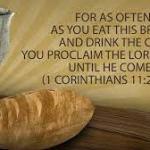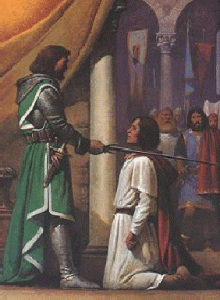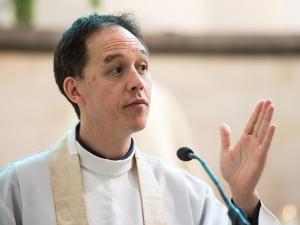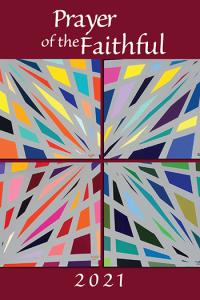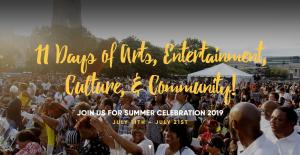
Celebrations of Grace: The Sacraments of the Catholic Church, Part 7
Sacraments are celebrations. That seemed like a new idea after the Council. Actually, the idea was there before but far in the background, behind more practical descriptions of Catholic worship like “service” and “spiritual food.” Now it seems to me that “celebration” describes sacraments perfectly.
Formerly, if I thought about celebrating at all, I might have thought: Jesus, who died for me, is alive and comes to me in this sacrament. I’m as close to God as I can be. I should feel like celebrating. Now I can’t look only in church for something worth celebrating. The reason for the celebration, the reason for going to church, is everywhere all along.
In the secular world we might celebrate a victory, the birth of a country or of an individual, the harvest, work, an important event—something outside the celebration. We also mark sad events. We have funerals to mark the death of a friend and country-western songs to help us deal with lost loves. These are also a kind of celebration.
Sacramental celebrations are like that. God is around us, behind us, in front of us in happy times and sad. We come together to celebrate the many ways that God has graced us with life and love, all the things God is doing, has done, and wants to do in our lives, in our world, in our history. We lament the wrongs we have done and the sorrows of the world. It’s not just that we get close to God in church. In our liturgies we bear in mind God’s constant presence and work in the world.
The celebrators
Before the Council the fact that the Mass is a celebration was there vaguely: We called one person “celebrant”—the priest who “said” the Mass and “administered” the sacraments to us individually. We “attended” Mass, made a “spiritual offering” to God, tried hard to have the right interior disposition, and “received” the sacraments. I don’t recall thinking of my part as celebrating.
Now the priest is presider over a whole assembly of celebrators. They participate in the work of the Mass, and they have special tasks that they alone can do. Interior disposition gets a big boost from knowing that our exterior participation matters. All of us assembled celebrate as a community.
Signs in the celebrations
Sacraments are signs. The once familiar catechism told us that, and it said exactly what the sign or signs were for each of the sacraments. To me it was wonderful that God comes to us through water, oil, bread, and wine. It made the ordinary things of life special because they had such highly honored “relatives.” The important thing, though, was the real, sacramental presence of Christ. No sign would ever look like that, I thought. The whole liturgy, solemn, mysterious and deeply moving, was there, I thought, to help me think only of the reality hiding “under” the sacramental signs.
What if the priest got his hands really wet, or you actually had to chew the bread and drink from a cup? What if the actions at the altar started to look like what people do when they share food and drink? Bolder signs like these might point us toward similar things outside church. I thought it was important to think only of the presence of Christ in the sacrament. I didn’t want to be “distracted.”
But Jesus is present in all those mundane activities like sharing a meal among family and friends. That’s what the signs of the sacraments can help us see. Signs do that best when they are close and large and boldly done. Today’s liturgy revels in bold signs, primary sacramental signs that are not just water, bread, wine, oil but the actions of people. These make the connection between sacraments and our ordinary lives visible.
Tasting the Kingdom of God
An interesting thing happens when people become involved in a liturgy that is a celebration. Its symbolic actions—coming together, sharing words of love and encouragement, sharing a community meal—really do look like the Kingdom of God, and it’s easy to believe that Jesus is with us. Jesus’ real presence isn’t so hidden in the sacramental signs as we used to think.
Celebration and sign—two ways of naming the connection between sacraments and our everyday lives. Celebrations are about something outside the celebration. Signs point away from themselves toward something else. Sacramental signs and celebrations point outward toward grace that is already occurring in our lives. They point backward to God’s action in history, especially through God’s Son, Jesus. They point forward to what God wants us to be and to the time when God makes all things new and Jesus returns. The signs help us see that all the things around us are graced even before some of them are honored as sacramental signs.
It’s OK if the Eucharistic banquet looks like a meal and makes us think of other loving meals shared with family and friends or, perhaps, of meals that we wish could be as peaceful and loving as this one. That’s not a distraction; it’s paying close attention to Jesus where we most often find him and to what Jesus wants us to be.
Think again:
Can you name something in particular that you felt it was important to celebrate in church? What is the difference between a distraction and the real meaning of the liturgy? When have you had the feeling that something that happened in church was like the Kingdom of God?
Image credit: Summercelebration.net via Google Images



